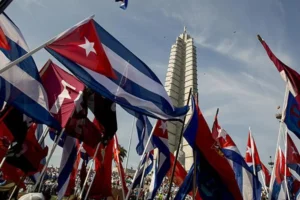
Argentina ended 2023 with an annual inflation rate of 211.4%, one of the highest rates in the world, making it the country with the biggest price increase in Latin America. The data are from the National Institute of Statistics and Census (Indec).
On Thursday (11), Indec announced the increase in inflation by 25.5% during the month of December. This means that the price index has doubled compared to the previous month, when an increase of 12.8% was recorded. This is the highest monthly indicator since February 1991, when the country was emerging from a cycle of hyperinflation.
Until November, different research institutes calculated that the year would end with an inflation rate of 160%. In itself, the number was already worrying, as it exceeded the accumulated price increase in 2022, of 94.8%. However, the first economic measures adopted by President Javier Milei’s far-right government included a drastic devaluation of the peso against the dollar and an increase in tariffs, which gave a new boost to inflationary dynamics.
The Indec report also shows that the biggest increases occurred in particularly sensitive areas for the most vulnerable sectors of society, such as food and health, which increased by 251.3% and 227.7%, respectively.
:: Milei assumes the presidency of Argentina, betting on an ultraliberal policy that has already worsened poverty ::
In this context, Argentine citizens from different social contexts say they feel their living conditions are worsening and denounce that the Milei government’s plans should deepen vulnerability.
Monica Alexander is a resident of Villa 21-24, one of the largest favelas in Buenos Aires. Together with other residents, she has been running a “community eatery” in her own home for years, part of a popular restaurant plan subsidized by the State. To the Brazil in factshe states that the government stopped delivering the food necessary to serve the population.
“We can’t keep up with the number of people arriving. Every day new people arrive, many of them have work, but it’s not enough and in the middle of the month they don’t have enough money to buy food”, he says. This is the sixth consecutive year that workers and retirees have seen their income deteriorate. According to calculations by consultancy Ecolatina, during the month of December 2023 alone, the drop in salaries in the formal sector was 10%, the largest in more than 20 years.
“We all knew that the new government’s measures would have a big impact, but what surprised us was the speed with which they happened”, explains Amitai Duek. To the Brazil in fact, the writer who lives in the central region of the Argentine capital says that the orthodox measures adopted by Milei were reflected very quickly in people’s economies. “When you go to supermarkets you see that they are empty, people buy less and make ends meet to buy basic and indispensable things,” he says.
:: Argentina: after the verbiage of the campaign, Milei must give in to Macri and the financial market ::
Amitai also points out that one of his biggest problems has been housing. This is because the owners of the rental property where he lives started demanding increases that violate the signed contract, something that, according to him, “is already happening to many people.”
The housing problem is a drama that threatens to become a real time bomb. Through the Decree of Necessity and Urgency (DNU), with which Javier Milei intends to repeal and modify 366 articles of law, the government removed all types of regulation from rental contracts. According to the National Tenants Federation, this has made it possible to increase rental contract renewals by 300% to 600% and many landlords are demanding that rents be paid in dollars.
“Last year was quite difficult from an economic point of view, but now, in the last month, uncertainty has increased a lot thanks to inflation”, says Luisina Darthes. The student told the Brazil in fact that she and her boyfriend had to leave their life in Buenos Aires due to the increase in prices.
“It has been impossible to pay the rent lately, so we moved to another city, where housing is still a little more affordable in terms of prices and contractual conditions. In the capital, prices are exorbitant, contracts are published in dollars and the adjustments are quarterly, linked to the inflation index, which is not proportionally accompanied by an increase in salaries, this is the biggest problem”, he explains.
Milei’s future and general strike
In the coming weeks, Javier Milei’s government will have to navigate a delicate space in which its fate is at stake. Since taking office on December 10, the president has been promoting the biggest economic and political reforms since the return of Argentine democracy in 1983. Meanwhile, the social climate seems to have less and less room to tolerate new adjustments.
Earlier this week, Congress began an extraordinary session to debate more than 600 articles that are part of a bill promoted by the Executive entitled “Bases and starting points for the freedom of Argentines”, which aims to reform almost all aspects of the country’s legal order. It grants extraordinary powers to the Presidency so that it can legislate without Congress, allows the privatization of all public companies, removes all regulations for the government to restructure external debt and criminalizes social protests in a way unprecedented since the end of the dictatorship military (1976-1983).
Economy Minister Luis Caputo announced on Wednesday (10) an agreement with the International Monetary Fund (IMF) to release US$4.7 billion that the country will use to pay its debt with the fund itself. The announcement came after the IMF congratulated the government on its “ambitious stabilization program” but warned that it would not continue producing disbursements if it did not achieve a “continuous and lasting implementation” of fiscal adjustment.
:: Caputo, the man who contracted 100 years of debt with the IMF, will command the Argentine economy in the Milei government ::
“There are aspects of this bill that have significant fiscal implications, and as such we hope that authorities will continue to gain political support to move this bill forward,” IMF communications director Julie Kozack said at a press conference in Washington on Thursday morning (11).
On the other hand, the powerful Central General de Trabalhadores (CGT), together with other unions in the country, has already announced a general strike for January 24th. Among their demands, the workers’ representation demands the repeal of the mega bill and the mega decree of necessity and urgency. The union action joins a series of demonstrations that have been taking place in the country since the announcement of the government’s economic and political measures. Along with the mobilization, the month of March is approaching, when Argentina discusses salary updates in the formal sectors.
Editing: Lucas Estanislau
Source: www.brasildefato.com.br

